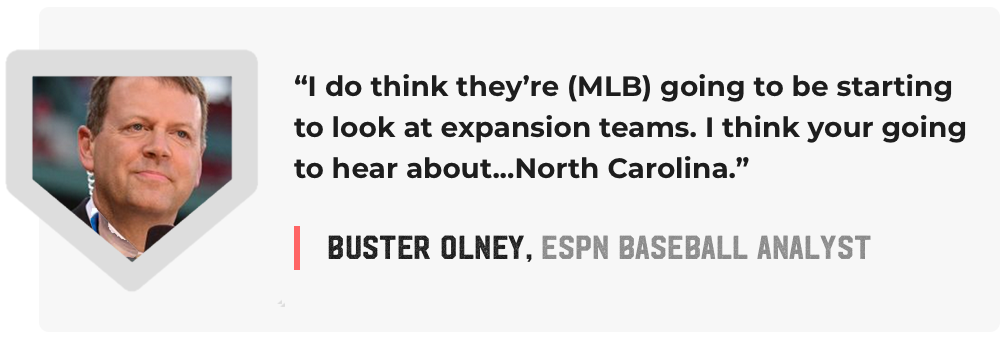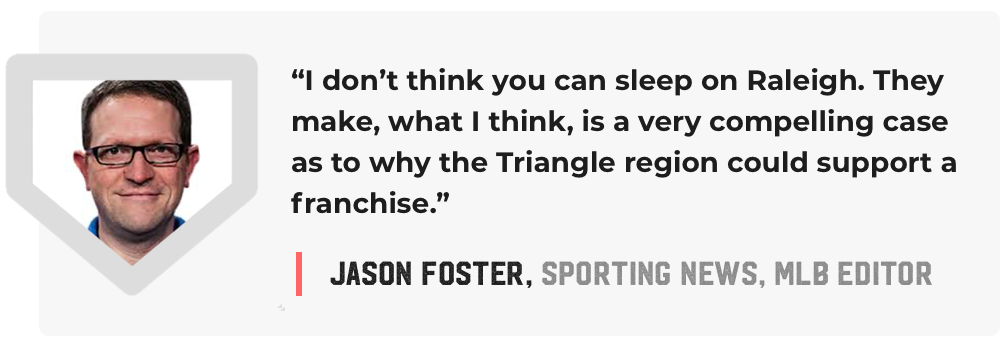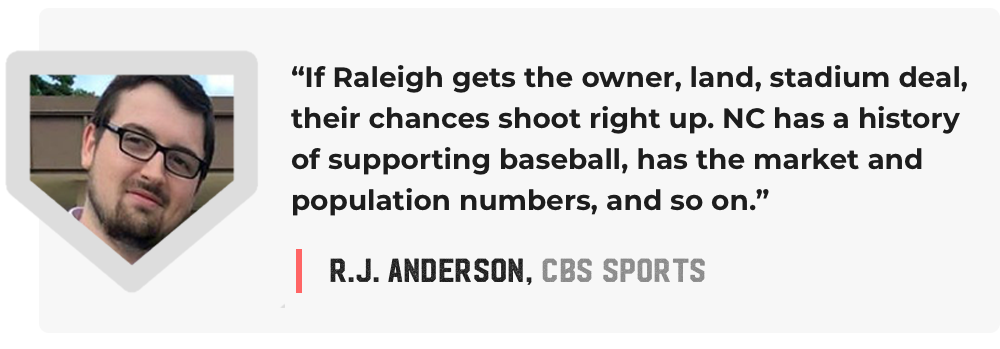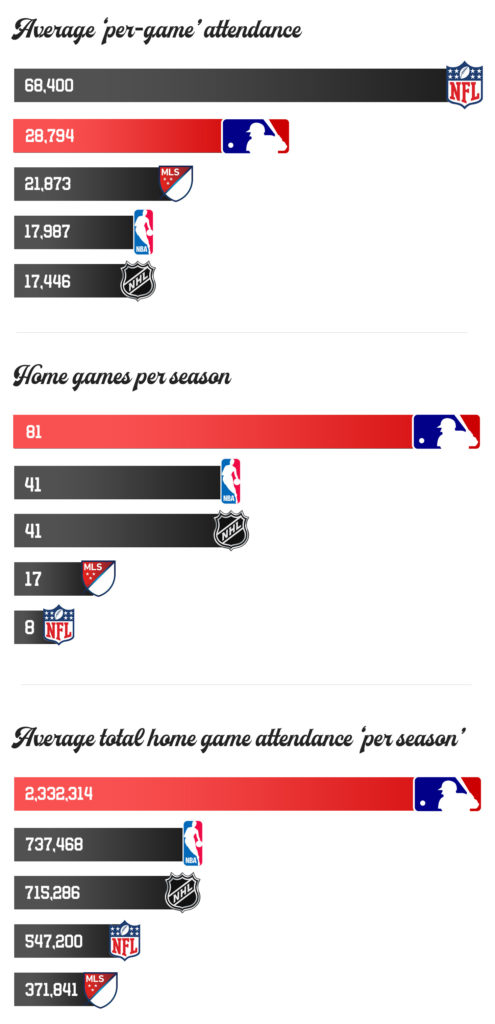The time to act on luring an MLB expansion franchise may not be too far in the future.
While plans for expansion have not been formally announced, MLB Commissioner Rob Manfred has made his aspirations to grow the league—likely by two franchises—abundantly clear. Going from 30 to 32 clubs makes sense for several reasons, from divisional reorganization to an overhauled postseason format to the injection of money in the form of expansion fees.
Initially, the thought was that it wouldn’t be before 2028 that new franchises would be awarded, however, recent developments may have expedited that timeline. Here is what we know now.
Expansion Gains could offset revenue losses
It’s no secret that MLB (and every other major sport) is losing billions during the near-nationwide COVID-19 lockdown. Some projections show that MLB could lose upwards of $4B, and more if the season doesn’t start soon.
How do you curb lost revenue while continuing to elevate your own private brand? Expansion.
With expansion fees set between $750M to $1.5B, money would be split amongst the remaining thirty clubs. As owners become increasingly worried about their own business, there lies an opportunity to gain significant financing.
FanGraphs recently published an article that hit on this very topic…

And Fangraphs weren’t the only ones talking about the league’s losses expediting expansion. Forbes also published a piece a few days later, talking about the very same topic.
For the first time since 1998, there is a serious, open discussion happening among MLB owners to expand.
Minor League Plan hints at Major League Expansion
For the last year, Major League Baseball and Minor League Baseball have been in heated negotiations about the future of baseball’s farm system. A recent article by Ballpark Digest, shows a hint of MLB’s future plans.
The gist of their article is that while MLB is looking to remove 40 current clubs/cities, there is a second phase being discussed which would include adding 8 new minor league cities into the fold.
So why would they eliminate 40 teams and then make note of ADDING 8? The answer is ‘expansion.’
In the new proposal, MLB teams would have 4 minor league affiliates (Low A, High A, Double-A, Triple-A), the math on 128 minor league teams is simple; 32 MLB teams.
Many in MLB, including negotiators, expect the final number of minor league teams to equal the 30 current MLB clubs, plus two expansion franchises.
Filling the Coverage Gap in MLB's Largest Dead-Zone
Like any good business, there is always a vision for what needs to be done for future success. One big point of emphasis is untapped fans and regions. The Carolinas are easily one of the biggest baseball markets without a team. Furthermore, as we’ve discussed, blackouts of national and regional broadcasts leave the Triangle without a local or even regional broadcast of Major League Baseball. (See full data here)
Many within the baseball ranks are already seeing the opportunity in North Carolina and marking it as a region of interest for MLB.



What are Raleigh's next steps?
Raleigh has been through this before… Here is a quote from N&O’s article on how MLS in North Carolina’s capital city was recently passed over for Charlotte
“So many years were wasted by the lack of anyone in this market to see what MLS could become, and what a great fit a team would be here: a sport played primarily in the summer, without direct competition from the colleges or the Carolina Hurricanes for most of the schedule.”
The point being made was Raleigh’s bid for MLS was too little, too late. The movement initially lacked an authentic community spark, big money and the attention to detail needed to gain undeniable momentum over other cities . By the time the house was in order to propose a truly competitive pitch, the window had already begun to close.
Instead of sulking, debating the ‘what-ifs’, or waiting another decade for MLS to contemplate expansion, it’s time we finally shift gears. With every major sport already in North Carolina, MLB is our next and, frankly, only remaining opportunity.
1. City Leaders Must Understand MLB’s Unique Benefit to the City
While there was always a sect of the population that was sold on soccer as the pro-sport that Raleigh needed to focus on, the majority of those interested in the MLS proposal was less interested in soccer as a sport and more interested in simply adding a stadium to their downtown.
A major sports venue would provide a staple entertainment option for Raleigh, a city who has always lacked a true calling card in that space. It would increase Raleigh’s profile as a pro-city, it would bring people downtown, fill more hotel rooms, bring more business to local restaurants, bars, and retail shops. And because of that increased business, the city would by default see an increase in tax revenue.
A good chunk of that tax money would then be filtered into the county’s ‘Tourism Tax Fund’ which is used to fund projects that increase tourism in Wake County. As you see, it’s designed to go full circle. However, doing so requires the county to make smart investments that increase tourism in downtown to the level that the project not only pays for itself but eventually begins to create a surplus (profit).
Any stadium proposal is going to come with an ask for county/state/city funds. You saw that with developers asking the county for $13 million per year for the next 20 years to help build the potential MLS stadium.
It was a substantial ask then, and now with MLS out of the picture and the similar amounts being talked about for a stadium that would house second division soccer, it seems even more daunting.
Let’s take a look at the likely tenants of the proposed downtown Raleigh soccer stadium: North Carolina FC and North Carolina Courage.
Last year, NCFC and Courage combined for an average attendance of 4,845 per game or just over 140,000 total fans. (In comparison, The World of Bluegrass Festival in Raleigh last year had an attendance of 223,000 in one weekend and with very little infrastructure investment.)
Now let’s look at what a potential Major League Baseball team would be expected to bring in.
MLB teams average 28,794 fans per game and play 81 home games per season. That means, on average, for even a small market MLB team, over 2 MILLION fans will head to the ballpark every season.
Here is the full breakdown of how MLB stacks up to all other pro sports in terms of bringing fans to their home city…

The point is, landing an MLB team is the cash-cow of pro sports for a city. The sheer volume of people that it brings to the stadium over the course of a season gives it, by far, the lowest risk and highest reward for any city looking to invest in bringing in one of the 5 major pro sports.
And we are at a unique moment in time that MLB expansion and Raleigh’s explosive growth as a viable market are lining up at the same time.
This may be Raleigh’s one and only chance to make this happen. We have provided the community arm of this movement, but there are other arms that must move in unison for this to become reality.
2. MLB needs to see the City give the seal of approval.
Cities that have made the biggest strides in MLB expansion are those that have the public and their government officials on the same page. This means Raleigh leaders, and us as the community, need to come together and make it clear that we want MLB and are willing to work with developers and the league office to make it happen,
Doing this will make Raleigh look a lot more welcoming to both the MLB League Office and billionaires waiting in the wings to get involved. We are told MLB has no shortage of potential ownership groups looking to land a team, they’re just hoping for the right city.
So what do Raleigh’s leaders have to do at this point? It’s pretty simple and it really doesn’t require much political capital.
They simply need to make a statement that Raleigh wants Major League Baseball. They need to let it be known, publicly, that the city is ready and willing to work with MLB and potential ownership groups to make it happen.
A statement like that does a lot of things for our city. It opens up conversations with the MLB League Offices and allows them to understand steps the league would like to see them take to get the ball rolling. At the same time, it sounds the alarm to investors, not just locally, but nationally that Raleigh is willing to work with groups to make this a reality.
That’s the first simple step in getting the ball rolling.
3. Money talks, but Raleigh may have an overlooked advantage
In the end, money talks. While it’d be great to find a local investment group, as mentioned before, MLB does have a list of investors waiting for the right opportunity. You have to pay to play, but being “Carolina’s team” would pay dividends fast.
The one unique advantage Raleigh holds right now is that we have a large, loud, campaign to bring MLB to our city and it isn’t owned by any ownership group, big money interest, or anyone looking to profit from a franchise being awarded. That means that the market to come in and be that ownership group is wide open.
This is not only rare but frankly, it’s unprecedented.
Usually, a movement like this is crafted and paid for an investor group. Look at Portland, Nashville, Montreal. They all have some sort of investor group staking claim to their respective regions and making a play to bring an MLB franchise.
However, with that comes complications.
For one, your region’s chances to land a franchise rest on that investor group. MLB may like your region and find it viable, but may not think your investor group is secure enough financially or they may not feel like they are a good fit for the league.
With investor groups staking claim to regions and starting movements, it makes it messy for other investors, potentially ones MLB feels more confident in, coming in and setting up shop.
MLB Raleigh’s advantage is that our movement is community-grown, authentic, and based solely on the people of the Triangle’s passion for bringing baseball here. That means, if the city takes the step in making it clear that they want baseball and are willing to work with MLB and outside ownership groups to make it happen, then they would potentially have the option of allowing MLB to recommend an ownership group they feel confident in, one that has been waiting for the right opening and right opportunity.
MLB wants to expand and is increasingly taking it more seriously with each week that goes by. At the same time, North Carolina is high on the preferred list because of rich its history and baseball success, it’s emerging demographics, and its placement in the middle of the East Coast’s largest MLB dead-zone..
Raleigh has the pieces to make a strong bid. So it’s up to us. We can sit back, wait, and hope an investment group gets involved soon, or we, as a city can be proactive in taking steps to make ourselves more marketable as a franchise destination.
It’s now or never if we want to put #RaleighOnDeck.